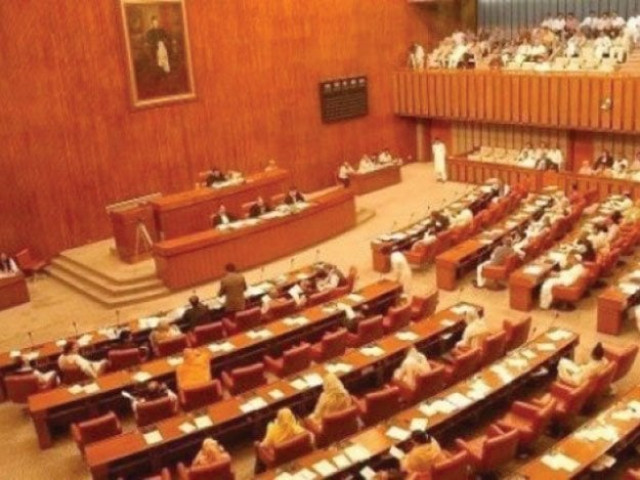Opposition walkout marks first Senate session under Sanjrani
Staged walkout against tax amnesty scheme enacted though a presidential decree

PHOTO: EXPRESS
The Senate session kicked off on Monday under the chairmanship of Sadiq Sanjrani, who succeeded Raza Rabbani in the vote last month.
Promulgation of a set of amnesty scheme ordinances just a day prior to the start of the Senate session provided opposition parties ample ground to flay the government. They called the government move a breach of parliament’s privilege and pressed the chairman to refer the matter to the privilege committee.
The chairman Senate, however, asked the opposition members to allow the government to lay these ordinances before the house.
A similar reaction is expected from the opposition in the National Assembly which will be in session from today (Tuesday).
Two main opposition parties – the PPP and the PTI – have already filed separate adjournment motions against the four ordinances promulgated on Sunday night.
Their protest is unlikely to have any impact on the decrees which would remain in effect for 120 days if not approved by parliament. The government is already planning to assimilate three of the four ordinances tagged as amnesty scheme, in the money bill it plans to present later this month.
Having a comfortable majority in the National Assembly, the government would easily get these legislations through as part of the money bill.
Govt to bar public office holders from availing tax amnesty scheme
PPP’s Sherry Rehman, who replaced Aitzaz Ahsan as opposition leader in the Senate, said that every law should be enacted through parliament. Bringing an ordinance at a time when both houses of parliament had already been summoned was a breach of parliament’s privilege, she said.
The government’s move helped the opposition coalesce as PTI members were complementing Sherry on raising amnesty scheme and other issues, garnering the support of other opposition parties.
Former chairman Senate Raza Rabbani believed that like normal legislations, cabinet’s approval was crucial before promulgating ordinances.
The House unanimously adopted a supplementary resolution, moved by the opposition leader, condemning state-sponsored violence in the Indian-occupied Kashmir. The house demanded of the government to appoint a special envoy to raise the Kashmir issue at international forums.
A PTI lawmaker introduced the Right to Free and Compulsory Education (Amendment) Bill, 2018 which was referred to the relevant committee.
The house deferred the Criminal Laws (Amendment) Bill, 2018 as the minister for law and justice claimed that the proposed amendment moved by a PPP lawmaker was already part of the law.
The house adopted three other resolutions recommending the government to allocate funds in the Public Sector Development Programme (PSDP) for opening new passport offices in all provinces, reduce prices of life-saving drugs and implement Aaghaz-e-Huqooq-e-Balochistan Package in letter and spirit.
The house rejected a PTI lawmaker’s resolution for providing development funds to parliamentarians. It dropped two private members’ resolutions because of the absence of the movers.
The house referred a motion regarding poor cellular phone services in Balochistan to the relevant committee. It also held a discussion on a motion about taxes levied on petroleum products.
FATF expresses concern over PM’s tax amnesty scheme
Meanwhile, State Minister for Finance Rana Muhammad Afzal said no law had been violated by ratifying the tax amnesty scheme and three other ordinances during a time when parliament was not in session.
Responding on a point-of-order raised by Senator Mian Raza Rabbani, the state minister said promulgation of ordinances during such a time was neither a breach of privilege nor did it constitute a legal violation.
He said that law provided for a timeframe and the law department was consulted before promulgating these ordinances. Approval of the cabinet was sought by circulating the ordinances before their promulgation, he said, adding that these ordinances would eventually be presented before the house and a debate could be initiated at that time.
Afzal said the government had worked hard to protect financial interests of the people. Power shortages, he added, were compelling investors to leave the country and it was not unfair to take steps for their return by catering to their energy requirements.
Senator Haroon Akhter Khan also endorsed the views of the state minister for finance, saying that no objection could be raised to the ordinances until they were placed before the house for debate.
(With additional input from APP)



















COMMENTS
Comments are moderated and generally will be posted if they are on-topic and not abusive.
For more information, please see our Comments FAQ